|
| Click on image for interactive map |
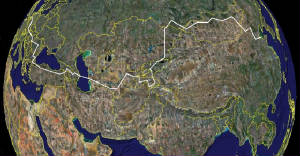
|
| Click on image for interactive map |
NORTHEAST, Kurdish, REGION Turkey, the return By Kambiz Taleghani 20080808-09 We entered Turkey late afternoon of Friday 8 August 2008 from Iran. The first order of business was for Adriana and Leila to free themselves of the
hot uncomfortable covers they were forced to wear in Iran. Freedom! They were so happy and upbeat
with their newly-found freedom again. It took about one
hour to finish the Turkish formalities. There was one of these shadowy characters (who insist upon helping you
and then charge an exorbitant amount as a fee) who just would not leave us alone. I ended up almost yelling at
him rudely. He left for five minutes and was back again stalking his prey - us. He had a horsewhip
which he kept slapping on his hands. Interesting. The
customs officer made a mistake in entering our vehicle's VIN (Vehicle Identification Number) in the computer.
We would not actually learn about this for another week until we arrived in Istanbul. This caused me untold headaches
and actually prevented us from being allowed to leave Turkey for a few days. Click here to read about it in the Story of the Aborted drive. After clearing the formalities we exited the government compound
and stopped a short distance outside the gate.  I looked at the mountains on my left that I would have had to negotiate some 30 years ago when I was trying to escape from
Iran. Seeing "this" side of the border for the first time, I am so happy I did not go through
with my ill-conceived plan 30 years ago. I would have ended up in a Turkish military camp! (see picture
at left. Behind the hill in background is Iran). The story of my multiple attempted escapes is a long
one (actually a book), outside the scope of this website. Maybe someday I'll get around to writing and documenting
it. Pretty harrowing if I may say so! My daughter has been encouraging me to write about it. I looked at the mountains on my left that I would have had to negotiate some 30 years ago when I was trying to escape from
Iran. Seeing "this" side of the border for the first time, I am so happy I did not go through
with my ill-conceived plan 30 years ago. I would have ended up in a Turkish military camp! (see picture
at left. Behind the hill in background is Iran). The story of my multiple attempted escapes is a long
one (actually a book), outside the scope of this website. Maybe someday I'll get around to writing and documenting
it. Pretty harrowing if I may say so! My daughter has been encouraging me to write about it. For the night we went to the town of Dogubayazit which is a short distance (22miles,
35 kilometers) from the border with Iran. On the way to Dogubayazit we passed by Mount Ararat where Noah's ark is
purported to have landed. Ararat is a dormant volcano. Over the course of past few thousand
years, it had been part of Iran, Armenia, Rome, Byzantine, and now in Turkey. Absolutely beautiful sight at sunset.
We took some pictures and videos.    
That night we stayed at the Golden Hill Hotel.
The rooms were okay and clean. Apparently it is the best hotel in town. The breakfast was on the rooftop
with an unobstructed view of the surrounding and, in particular, mount Ararat. Very enjoyable. The next morning we visited the town of Dogubayazit to replenish some supplies.
   
While Leila and I were struggling to communicate in Turkish,
we learnt most of the town's merchants actually spoke Persian! It was funny. The two of us would start stuttering
and struggling in our broken Turkish; then received responses in fluent Persian and English! We wanted to visit Armenia before shipping the car from Georgia, but borders between Turkey and Armenia are closed.
So, we had to drive north to Georgia first. Then turn around drive south after crossing the border into Georgia, and finally
enter Armenia from Georgia. To reach Georgia /
Armenia we had to drive north through some Kurdish territories. Lots of military roadblocks. ... and
a few villages. High altitutes. Cold climate. 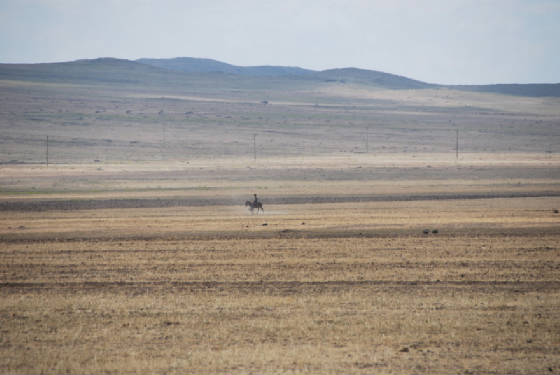 
Kurds are the descendants of one of the Aryan tribes/groups that moved
into this area between 3000-4000 years ago from Central Asia. Kurds can be found in Eastern Turkey, Western
Iran, and Northeast Iraq. Between the three nations of Iran, Iraq, and Turkey, the Kurds seem to have been most
at peace (relatively speaking!) in Iran. Persians and Kurds are of similar origins: the Aryans of
Central Asia. Turks are descendents of Turkic tribes which moved to Anatolia less than 1000 years ago, also from Central
Asia. The Turk's consolidation of the area is best recognized by the capture of Constantinople (Istanbul)
and capitulation of the Byzantine, Eastern Roman Empire by Sultan Mehmed the Second in 1453. Thus the beginning
of the Ottoman Empire and the present day Turks of Turkey.  Historically, the animosity seems to date back to Central Asia over many thousands of years ago when the Turkic
tribes gradually pushed the Aryan (read Scythian) tribes from their pastures and habitation. The push continues
even to this day as evidenced by the Uzbek's efforts of imposing all things Turkish on Tajiks (Persians) of Bukhara and
Samarqand in Central Asia. Some "things" don't change much, even over the course of many thousands of
years! In researching this little piece, it seems the cultural influences act as waves advancing, and receding, over
the course of many thousands of years. They sort of move in and out across the land with generations. So
interesting. It seems the Turkic people have been able to overcome other cultures in their expansion. Evidenced
by Turkmenistan, Azerbaijan, and, of course, present-day Turkey. These were all countries with a different culture
and language not too long ago (meaning less than a 1000 years ago). Something very interesting I read about Kurdish Jews and
Kurdish Christians is that they still speak Aramaic (the language of the Bible). Kurdish language belongs to Indo-Iranian
language group. Historically, the animosity seems to date back to Central Asia over many thousands of years ago when the Turkic
tribes gradually pushed the Aryan (read Scythian) tribes from their pastures and habitation. The push continues
even to this day as evidenced by the Uzbek's efforts of imposing all things Turkish on Tajiks (Persians) of Bukhara and
Samarqand in Central Asia. Some "things" don't change much, even over the course of many thousands of
years! In researching this little piece, it seems the cultural influences act as waves advancing, and receding, over
the course of many thousands of years. They sort of move in and out across the land with generations. So
interesting. It seems the Turkic people have been able to overcome other cultures in their expansion. Evidenced
by Turkmenistan, Azerbaijan, and, of course, present-day Turkey. These were all countries with a different culture
and language not too long ago (meaning less than a 1000 years ago). Something very interesting I read about Kurdish Jews and
Kurdish Christians is that they still speak Aramaic (the language of the Bible). Kurdish language belongs to Indo-Iranian
language group. Last week (i.e. July 2008) Kurdish rebels had
taken a few European tourist/hikers as hostages near mount Ararat. The atmosphere in the news media was tense!
 The atmosphere on the ground (i.e. where we were) was relaxed! The mood at the Turkish military roadblocks seemed
amazingly relaxed, party-like, and confident. At every military roadblock, the Turkish soldiers were giggling
at the sight of our "American" car. An average family of 3 tourists with American passports! For
all intends and purposes we could have landed from Mars! The atmosphere on the ground (i.e. where we were) was relaxed! The mood at the Turkish military roadblocks seemed
amazingly relaxed, party-like, and confident. At every military roadblock, the Turkish soldiers were giggling
at the sight of our "American" car. An average family of 3 tourists with American passports! For
all intends and purposes we could have landed from Mars! A
typical Turkish military roadblock consisted of soldiers behind barricades on both sides of the road. The commanders were
usually around not too far away. There was a kiosk type of shelter next to the shoulder. There were always
one or more tanks, personnel carriers, jeeps, trucks, etc. The lower the ranks the more informal and joking
were the military personnel. Higher-ups seemed more formal and tense. I guess responsibility
does that to you! At every military roadblock the
young Turkish soldiers would gather around our car (i.e. when their commanders were not looking!), had fun joking with us,
while their military officers were sweating on their two-way radios trying to decide what to do with us!
At one military roadblock, when the boss was not looking one enterprising soldier even tried to advise me on how to place
some bets with on a regional football/soccer match scheduled that weekend somewhere nearby! Just then he
saw his commander approaching. He quickly whispered the name of the favoured team, "Sivas Sport" (for my future
betting benefit!), put a sober serious face on, and snapped to attention - guarding the post! At all military
roadblocks we were eventually allowed to pass. We got closer to mount Ararat. The roads were paved and in
excellent condition. Few vehicles. Mostly local trucks and tractors. If you want to climb or hike
around mount Ararat you have to apply to the Government about a year (or two or three!) in advance and wait. If
eventually allowed, you pay a hefty daily fee (I heard $400 per day) and must be accompanied by guides recognized by the Turkish
military.  About 30 km north of Dogubayazit we saw an interesting side mountain road, and took it. It seemed to offer a good vista
for taking pictures of the plains below (picture on the right). ... About 30 km north of Dogubayazit we saw an interesting side mountain road, and took it. It seemed to offer a good vista
for taking pictures of the plains below (picture on the right). ...

. . . . ...AND It climbed the side of mount Ararat! (the road
is barely visible in the picture on the left. In the distance it snakes as it climbs the mountain's volcanic slopes).
That was great! No permit. No waiting. Just drove-in!
After a few minutes on the road we reached a small village/settlement.  At this altitute they depend on seasonal streams resulting from snow melt. After the stream dries, they haul
their water in tanker trailers pulled by tractor. Water was scarce in August. (the back of the water tanker is visible in the picture on left) At this altitute they depend on seasonal streams resulting from snow melt. After the stream dries, they haul
their water in tanker trailers pulled by tractor. Water was scarce in August. (the back of the water tanker is visible in the picture on left)
Leila and Adriana went out. 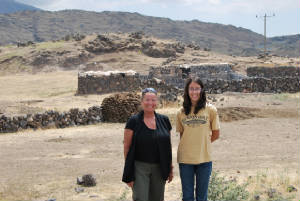 The children approached. They were hesitant and
shy at first. I pointed the camcorder at them and rotated
the viewing screen towards them. As they approached suddenly they saw their own images on the screen and went
wild with laughter (picture, below left and right). Very playful in front of the
camera.    The parents were standing at a distant and watching. They must have been curious why their children were
so excited! The parents were standing at a distant and watching. They must have been curious why their children were
so excited!
. . . .  As I scanned the camera, I zoomed in to get a better detail of the mountain and saw something that looked like Noah's
Ark. I was sure my eyes were playing a trick on me, and said so to Adriana and Leila. We all laughed,
because mount Ararat is where Noah's Ark is supposed to have landed! As I scanned the camera, I zoomed in to get a better detail of the mountain and saw something that looked like Noah's
Ark. I was sure my eyes were playing a trick on me, and said so to Adriana and Leila. We all laughed,
because mount Ararat is where Noah's Ark is supposed to have landed!
(Honestly, Do you see Noah's Ark in the picture on the right? I don't. I didn't. or...
did I ?! Now look at the magnified picture below!) A
few months later I was researching something on the internet and came across a Greenpeace project in Turkey.
 That was it! That "mirage" was
no mirage!! I had actually seen a replica of Noah's Ark built the previous year by the Greenpeace group from Germany!
I cannot believe we came so close to it (within 5-10 minutes driving) and did not actually go to see it.
I truly thought my eyes were playing a trick on me!! What a shame. What a pity.
Next time I will believe my own eyes better! I mean, what would you do if you suddenly got a vision of Noah's
Ark on mount Ararat?! Double-check the bible, maybe? Or, just go there and check it out?! I
still can't believe we did not actually go to investigate. I truly thought that was a rock formation
which, with the sun shining at an odd angle, was playing a visual trick and just seemed like an Ark from far away.
To this day I beat my head on the wall whenever I think of it! (to be honest, at the same time, Adriana
was not happy about being there and was anxious to leave. She kept reminding us to leave the area.)
| Click on image for interactive map |

|
| Click on image for interactive map |
Road to ERZURUM Turkey By
Kambiz Taleghani 20080809 Later that day,
we drove further north for a few hours and came within 1000 feet of Armenia, but could not enter the country because the border
between Turkey and Armenia is closed. I was very excited and disappointed. Excited because we were within 1000
feet of Armenia. Disappointed because we would now have to drive TWO days (Turkey -> Georgia -> Armenia) to get
to the other side of the border, a mere 1000 feet away. On this same day we learned that Russia had started bombing selected sites in Georgia. Our shipping port
in Georgia was one of them. Well, so much for using Georgia as a bridge to get to Armenia. So much for using
Georgia as a shipping point for our car. I won't bore you with the details here. If you are interested, Click here to read the full story of our Abandoned drive happenings. The decision came quickly. We abandoned our planned
visit to Armenia. Abandoned shipping plans from Georgia. The next shipping port was Istanbul. Istanbul was
a few days drive West. We decided to go to Istanbul and search for a ship to send our car back to LA.
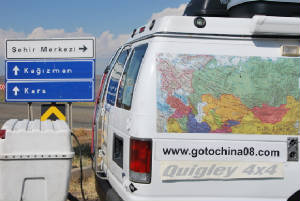 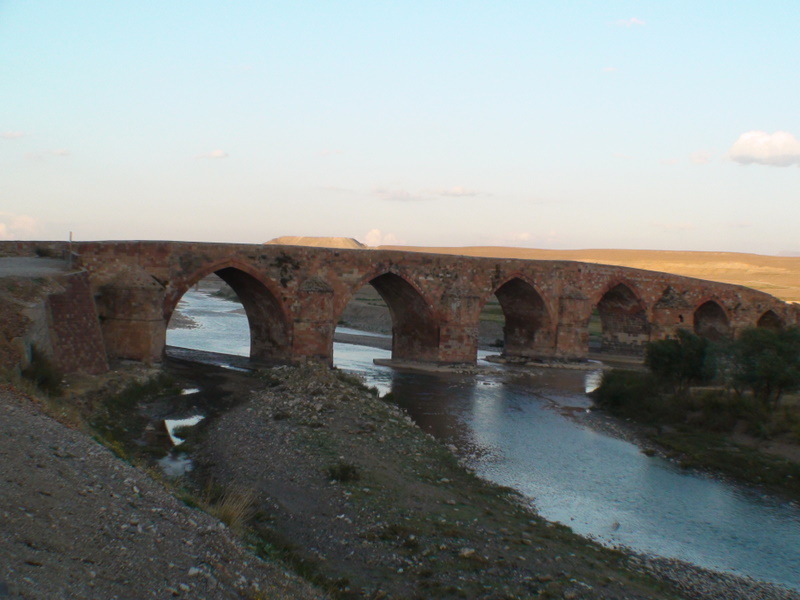
Istanbul here we come. (Actually there was
a lot involved in re-planning. I am sparing you the boring detail). 

Now, here is something interesting. Dung brick, or super cow chips!
(pictures above, right, and below) That is right, similar to Mongolia. With scarcity of wood, animal dung is reconstituted
into bricks (cow chips) and then dried in the sun. They are then stacked to form dung walls or towers. It
has no smell! I can attest to that. I tested it with my good nose! No smell, honest! It is used
for cooking and winter heat. Apparently it burns almost smokeless and has a very high BTU, meaning it gives high
heat. When you think of it, this is a very good recycled clean heat. No oil or forests are needed
to deplete! I tell you, this one has my two-thumbs-up. Let us hope some environmentalists pick
on this one. Hey you guys in central California and Texas, how about this? Here is an idea to put your mountains
of cow dung to good use.  
Clean fuel. Environmentally-friendly! Stops that nasty runoff
and seepage into the groundwater. May need some good marketing, though!!!!! .  To celebrate our latest mishap, we drove off the highway using the 4x4 feature of our car, stopped in a beautiful field of
grass, brought out a watermelon we had purchased earlier together with Feta cheese and fresh baked bread; and had a nice picnic. To celebrate our latest mishap, we drove off the highway using the 4x4 feature of our car, stopped in a beautiful field of
grass, brought out a watermelon we had purchased earlier together with Feta cheese and fresh baked bread; and had a nice picnic.
 Kambiz and Leila conducted a couple of running races within sight of Armenia for the benefit of whomever was watching
us with their binoculars (border guards?!). The three of us had a hilarious watermelon seed spitting (excuse me, "throwing".
That is more polite!) contest within the sight of internationally disputed borders. That'll show them!!
I ate so much cheese and watermelon I was about to explode! Kambiz and Leila conducted a couple of running races within sight of Armenia for the benefit of whomever was watching
us with their binoculars (border guards?!). The three of us had a hilarious watermelon seed spitting (excuse me, "throwing".
That is more polite!) contest within the sight of internationally disputed borders. That'll show them!!
I ate so much cheese and watermelon I was about to explode!
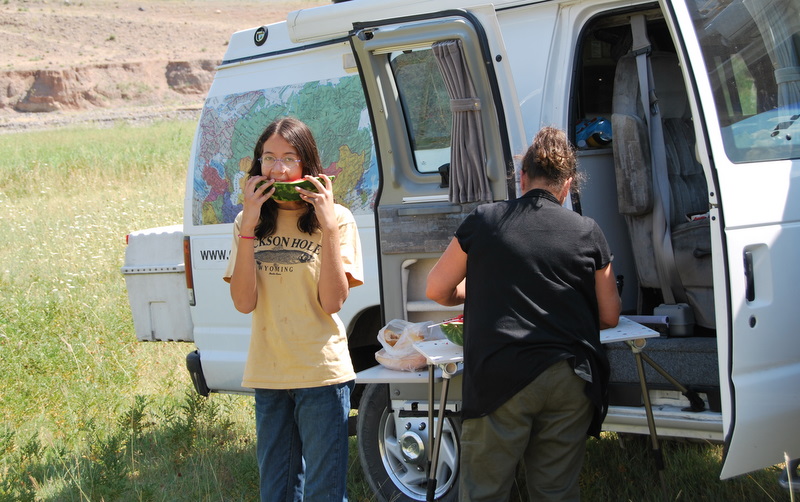 
Eventually, we closed camp and dragged ourselves into the car, climbed
the hill very slowly in low gear 4x4 mode, and got back to the road - to, ... let's see... towards... Erzurum,
Turkey! A funny sight came into view while we were slowly climbing
the hill with our 4x4 off the road in low gear, on the way back to the highway. A young amorous couple had come
this far with two motorcycles and were enjoying themselves, thinking this to be such a remote location, I suppose.
Suddenly we appeared while the couple were deep into making love! Their clothes were nicely hung on the
nearby branches, with their motorcycles not too far away. We were far enough and they were so deeply
involved that they did not notice us (or didn't care). Anyway, it was funny. We distanced
ourselves quickly and left the couple to themselves. I tell you, exciting place, this closed Turkish-Armenian border!
The episode gave a literal meaning to the phrase "make love,
not war"! (Pictures below: We saw this boy riding the loaded donkey
backwards near one of the villages on our way. I am so glad the pictures came out okay. Very
special.)    
Arrived in Erzurum that evening and stayed at Marriott hotel
in a ski resort. What a relief after 10 days of driving from Azerbaijan through Iran and Eastern Turkey.
We wanted to stay here forever! None of us wanted to leave the next day.  The Marriott hotel was fabulous. Indoor swimming pool, Turkish steam bath (of course!), sauna, gym, etc.
The restaurant was beyond description (after what we had been eating for most of the previous 10-15 days). I really
thought I was going to explode that night from overeating their delicious food. It was a sumptuous gourmet buffet!
On top of that they had live music and dancing. A group of friends, Turkish ladies, went to the dance stage and
engaged in such a sensational, graceful, and beautifully rhythmic dance. (see video). They seemed
conscious of the camera. I wish I could have recorded the whole thing on tripod, but it did not seem appropriate.
So, I left the camcorder on the table and hoped for the best. (see the video. It is intermittent). The Marriott hotel was fabulous. Indoor swimming pool, Turkish steam bath (of course!), sauna, gym, etc.
The restaurant was beyond description (after what we had been eating for most of the previous 10-15 days). I really
thought I was going to explode that night from overeating their delicious food. It was a sumptuous gourmet buffet!
On top of that they had live music and dancing. A group of friends, Turkish ladies, went to the dance stage and
engaged in such a sensational, graceful, and beautifully rhythmic dance. (see video). They seemed
conscious of the camera. I wish I could have recorded the whole thing on tripod, but it did not seem appropriate.
So, I left the camcorder on the table and hoped for the best. (see the video. It is intermittent).
We had such a grand time that, now that we are back in Los
Angeles, Leila and Adriana want to go back to Erzurum, Turkey to ski this coming winter!  
. . . . . . . Look at the size of that sink hole on the right --> It had rained hard the previous two days and this sink hole had taken most of the road with it.
Lucky that no one was hurt. . . . . . .
| Click on image for interactive map |

|
| Click on image for interactive map |
From Erzurum to SIVAS Turkey By
Kambiz Taleghani 20080810 The next day we left Erzurum and continued driving west.  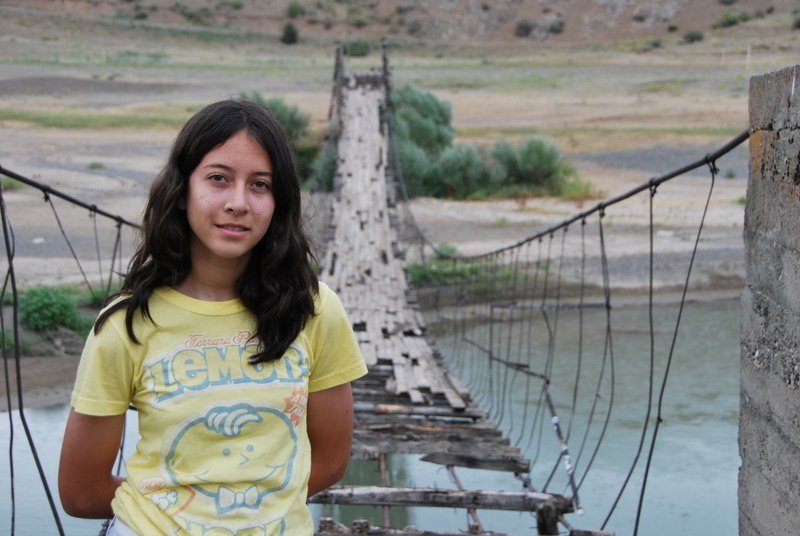 
We drove towards the town of Sivas and Kayseri, built by the Cesar
of Rome.  On our way, we stopped at a small dammed creek for fishing. A local fisherman was there with his hand-made
net. He caught a good one. Once he saw our spinners, got very excited and borrowed a simple hook,
which he quickly tied to a nylon line and cast off with some dough as bait. In a few minutes he caught a fish.
He was so happy and singing. We kept talking. He in Turkish and us in Persian / English / Azeri and whatever we
could muster in Turkish. We each knew (or guessed) the other was talking about fishing, but that was about it.
Good conversation for about an hour!!! On our way, we stopped at a small dammed creek for fishing. A local fisherman was there with his hand-made
net. He caught a good one. Once he saw our spinners, got very excited and borrowed a simple hook,
which he quickly tied to a nylon line and cast off with some dough as bait. In a few minutes he caught a fish.
He was so happy and singing. We kept talking. He in Turkish and us in Persian / English / Azeri and whatever we
could muster in Turkish. We each knew (or guessed) the other was talking about fishing, but that was about it.
Good conversation for about an hour!!!
 While fishing at the edge of the water I heard a very loud splash of an animal jumping into water near us. Yes, live
animals sound different from a solid object when they hit the water. Would you believe that it was a huge (... and I
mean H U G E ) snake. Its triangular head was an easy 8cm (3 inches) wide. It swam away fast and graceful.
It must have fallen off the retaining wall under the shade of the bridge near us. I still shudder, not at
the snake itself, but at the loud sound that the splash made. The echo under the bridge made the sound even more pronounced. While fishing at the edge of the water I heard a very loud splash of an animal jumping into water near us. Yes, live
animals sound different from a solid object when they hit the water. Would you believe that it was a huge (... and I
mean H U G E ) snake. Its triangular head was an easy 8cm (3 inches) wide. It swam away fast and graceful.
It must have fallen off the retaining wall under the shade of the bridge near us. I still shudder, not at
the snake itself, but at the loud sound that the splash made. The echo under the bridge made the sound even more pronounced.
Continued west. Drove towards Sivas.
 On the way we witnessed the Azerbaijan-Europe oil pipeline on fire. "Kurdish Workers Party" had claimed
responsibility for the explosion. We stopped and took videos briefly, before being chased away by the soldiers.
A few soldiers, workers, and engineers were there. They weren't doing much. They were probably
waiting for the oil in the pipe to spill all out and burn before they started the repairs. A few days later we
saw an English-language newspaper with its large headline, you guessed it, OIL PIPELINE SABOTAGE - FIRE. Turkey
was losing $300K per day in lost fees. On the way we witnessed the Azerbaijan-Europe oil pipeline on fire. "Kurdish Workers Party" had claimed
responsibility for the explosion. We stopped and took videos briefly, before being chased away by the soldiers.
A few soldiers, workers, and engineers were there. They weren't doing much. They were probably
waiting for the oil in the pipe to spill all out and burn before they started the repairs. A few days later we
saw an English-language newspaper with its large headline, you guessed it, OIL PIPELINE SABOTAGE - FIRE. Turkey
was losing $300K per day in lost fees. That night we slept in a hotel in downtown Sivas. It was on a crowded downtown street.
To park our oversized car overnight, I was concerned about theft. One of the hotel staff sat with me and directed us
to their very safe parking. It was the local police station parking! All police and detectives'
offices on the second floor overlooked the parking lot. All heads came to the windows looking at our strange
contraption taking multiple parking spaces! This was one place I did not lose any sleep that night worrying about
theft! 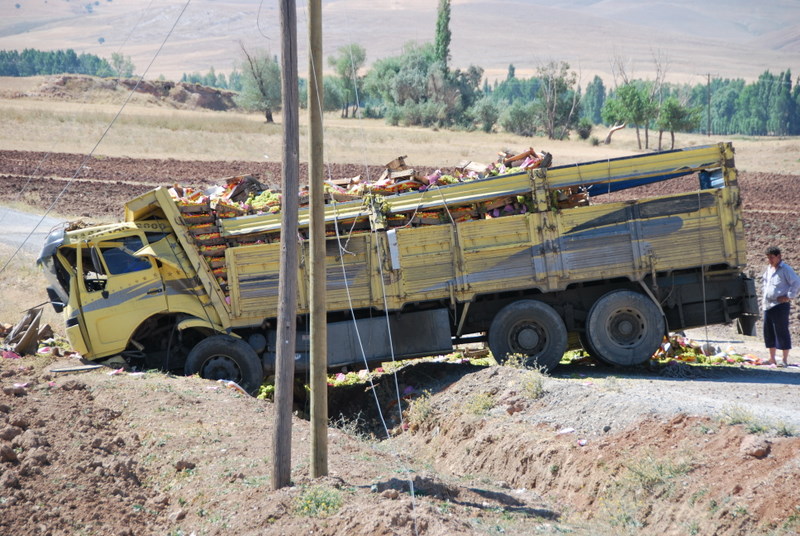 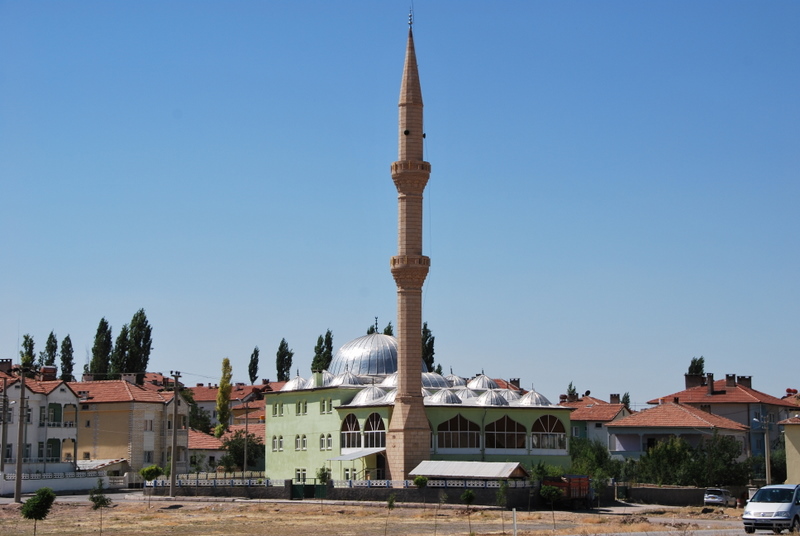
The following day we drove to Cappadocia.
| Click on image for interactive map |

|
| Click on image for interactive map |
CAPPADOCIA Turkey By Kambiz Taleghani 20080811-13  
Cappadocia (or Kappadokia as Turks call it) is a white
volcanic rock region with over 200 cave villages and underground towns.
 
 All the caves have been dug and carved by hand. The largest cave/town could house 8000 people in case of invasion.
Self contained for 4 months. Each underground town consists of a series of tunnels and chambers dug in a spiral
descending shafts and chambers. These towns functioned as a hiding place against invaders. They
had underground rivers. Ventilation shafts. Bathhouses. Morgue. Chapels. Kitchens. Well-conceived
waste disposal, etc. All the caves have been dug and carved by hand. The largest cave/town could house 8000 people in case of invasion.
Self contained for 4 months. Each underground town consists of a series of tunnels and chambers dug in a spiral
descending shafts and chambers. These towns functioned as a hiding place against invaders. They
had underground rivers. Ventilation shafts. Bathhouses. Morgue. Chapels. Kitchens. Well-conceived
waste disposal, etc.
Very interesting place. So glad we got a chance to stay there. We stayed at a cave hotel called Museum
Hotel.   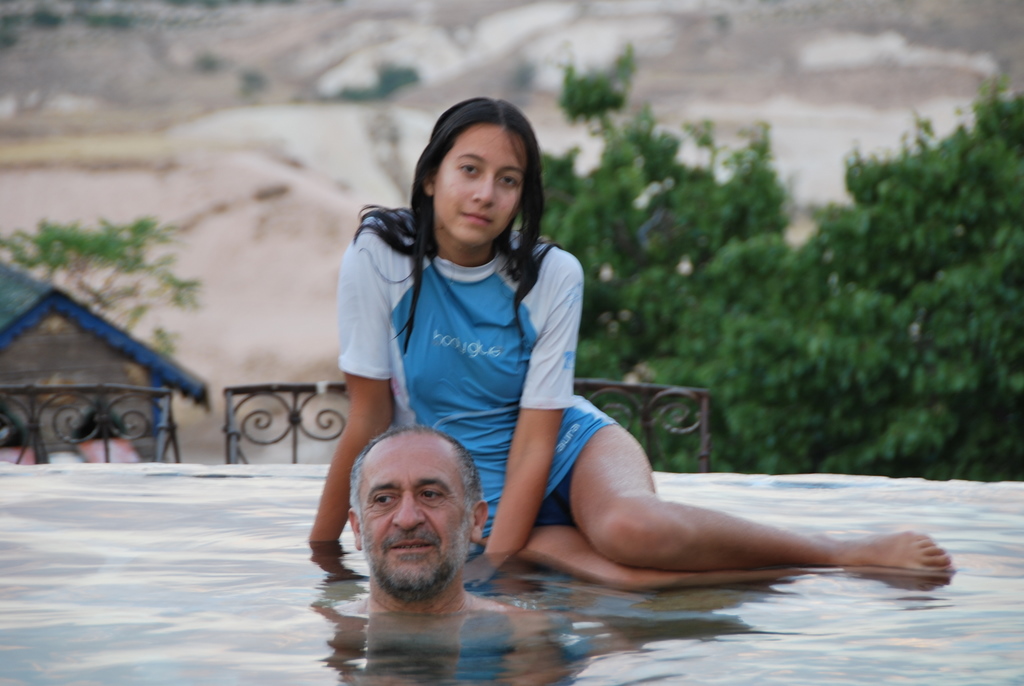  
Very well appointed. Super clean and organized.
A true 5 star hotel. See pictures and videos.  Leila and I (Kambiz) went horseback riding one afternoon. There are quite a few orchards and vineyards next to the river
in the wide valley. Makes for very nice riding trails. The owner was organizing a riding party to
fly to Ashgabat (Turkmenistan), buy Turkmen (Akhal Teke) horses, and ride them back to Turkey. That would be a
1500 mile (2400 Km) horse trip through Turkmenistan, Iran, and Turkey. Leila and I (Kambiz) went horseback riding one afternoon. There are quite a few orchards and vineyards next to the river
in the wide valley. Makes for very nice riding trails. The owner was organizing a riding party to
fly to Ashgabat (Turkmenistan), buy Turkmen (Akhal Teke) horses, and ride them back to Turkey. That would be a
1500 mile (2400 Km) horse trip through Turkmenistan, Iran, and Turkey.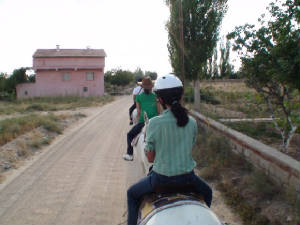
In Cappadocia we encountered our first Americans after 1½ months.
Such relief and pleasure! A nice family from San Francisco vacationing in Turkey. Had dinner together. We discovered
that three of us (Kambiz and the other couple) had studied at Stanford University. Apparently we had had few of
the same instructors as well. They had gone on a balloon ride in Cappadocia and loved it. Unfortunately
we had to leave the next morning and could not try it. The balloon company was quite large and highly organized business.
Hopefully next time! 
Looking back, Cappadocia is one place we would like to revisit. 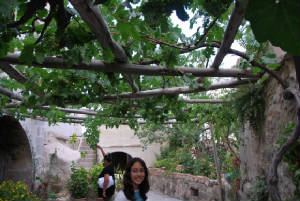
From Cappadocia we drove non-stop to Istanbul.
On the way, we passed by Ankara, the capital city. The roads were very good and fast. We arrived
in Istanbul on a Wednesday night and stayed at Radisson Hotel by the Bosphorus. Really nice hotel. Immediately in front
of the water.
| Click on image for interactive map |

|
| Click on image for interactive map |
ISTANBUL, the return Turkey By
Kambiz Taleghani 20080814-19  We arrived in Istanbul on a Wednesday night and stayed at Radisson Hotel by the Bosphorus. Really nice hotel. Immediately
in front of the water. We arrived in Istanbul on a Wednesday night and stayed at Radisson Hotel by the Bosphorus. Really nice hotel. Immediately
in front of the water.
Most of my (Kambiz) time was spent with shipping brokers, Turkish Customs, at the port, and with notary publics --
trying to arrange shippment for the car. Incredible amount of work for a such a simple task.  .  It was a real pleasure to sit by the water for breakfast
and dinner.     
At summer nights, the cool breeze of the sea combined with
decorative lighting on buildings, gardens, bridges, and even mosques gave this place such a special feeling.    
We went to Istanbul for two nights, and stayed for Five.
Due to some snafu by Turkish Customs, we were not allowed to leave the country! Click here to read the full story. All
three of us caught a nasty cold and rested in bed as much as we could, nursing our fevers.   It was tough because Kambiz had to go to port, Customs, and
other places during the days. We did manage to see a few interesting tourist sites as well.      Near the hotel was a square with lots of pigeons. Leila
and Kambiz had a field day with the birds. Almost the entire length of water front are fancy hotels and restaurants. Dolme Baghcheh  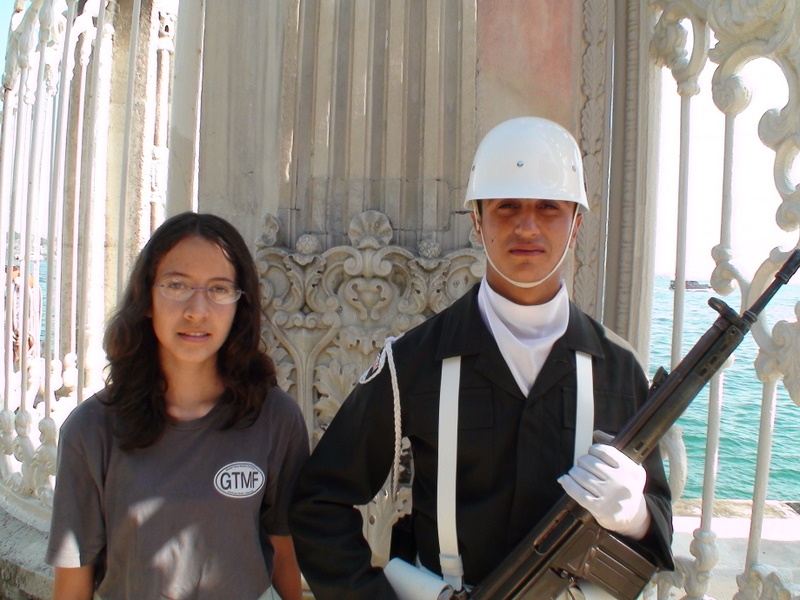
This was the residence of the Sultans. Very
nice gardens. Impressive palaces.  The harem and lifestyles were very interesting to see. The women had to stay in the palace most of their lives!
It seemed they were mostly indoor. Each wife had an apartment. The Sultan's mother had the largest Suite.
For the most part the women could not be seen. By today's standards, it sounded suffocating. A
fancy jail for lifetime. I have frequently wondered how the women felt. I suppose present day Saudi Arabia
is something like that. Depressing to think about - the waste of a "doomed" life. I am often reminded
of a story I read of a very smart girl in that part of the world with dreams and ambitions, until she reached the age of 6-7
and gradually began to realize non of her dreams could be realized because she was a woman. To this day, I shudder
and cry at the waste and cruelty of yesteryears. The harem and lifestyles were very interesting to see. The women had to stay in the palace most of their lives!
It seemed they were mostly indoor. Each wife had an apartment. The Sultan's mother had the largest Suite.
For the most part the women could not be seen. By today's standards, it sounded suffocating. A
fancy jail for lifetime. I have frequently wondered how the women felt. I suppose present day Saudi Arabia
is something like that. Depressing to think about - the waste of a "doomed" life. I am often reminded
of a story I read of a very smart girl in that part of the world with dreams and ambitions, until she reached the age of 6-7
and gradually began to realize non of her dreams could be realized because she was a woman. To this day, I shudder
and cry at the waste and cruelty of yesteryears.  Thankfully, the present-day Turkey seems to have freed itself for the most part. Although, while we were there,
there were rumblings of turning the clock back again! I have often wondered, how could the women just be quiet
and allow this to happen? Conditioned to the eventuality since birth? A bit puzzling! Thankfully, the present-day Turkey seems to have freed itself for the most part. Although, while we were there,
there were rumblings of turning the clock back again! I have often wondered, how could the women just be quiet
and allow this to happen? Conditioned to the eventuality since birth? A bit puzzling! The Dolme Baghcheh palace fronted the waters of Bosphorus. 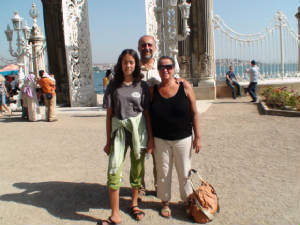 There are a few gates that open to the water. Boats and yachts could come and tie down at the water gates.
The view from the gates and from the second floor of the palace is beautiful. If you go there don't
miss the palace guard, and the changing of the palace guards. During their one-hour post, they stand absolutely still.
You can do and say what you want, they still remain still. A few people were unsuccessfully joking and clowning
in front of the guard to see if they could make him laugh or react. There are a few gates that open to the water. Boats and yachts could come and tie down at the water gates.
The view from the gates and from the second floor of the palace is beautiful. If you go there don't
miss the palace guard, and the changing of the palace guards. During their one-hour post, they stand absolutely still.
You can do and say what you want, they still remain still. A few people were unsuccessfully joking and clowning
in front of the guard to see if they could make him laugh or react. Aya Sofia (Hagia Sophia) Church / Mosque This was originally
a church constructed between 532-537 a.d. on orders of the Byzantine Emperor Justinian. Then the Turks conquered Istanbul
and converted the building to a mosque. The Moslems covered the wall painting and mosaics with plaster.
Then in early 20th century the Ottoman Empire fell and modern Turkey emerged.  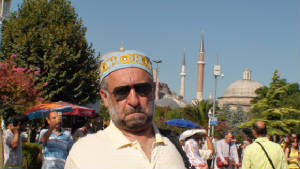
Ata
Turk, the founder of modern Turkey, created a secular state separating religion from state. To avoid a conflict between
Turkey's Christians and Moslems on whether Aya Sofia was a church or a mosque, Ata Turk declared the place a "museum"!
So, we visited the Aya Sofia museum!  Note the sign in the picture: "Sitting on the steps is absolutely forbidden" Note the sign in the picture: "Sitting on the steps is absolutely forbidden"
It still has one of the largest domes in the world. Almost all the
current mosques in Turkey are modeled after Hagia Sophia. It was hot on the day we visited it Very crowded.
We took a two-hour guided tour of the museum. Very interesting. The Blue Mosque The Blue Mosque is literally across the street / park from Hagia Sophia. The Sultan Ahmed Mosque is the national mosque of Turkey. The mosque is one
of several mosques known as the Blue Mosque for the blue tiles adorning the walls of its interior. It was built between 1609
and 1616. The Sultan Ahmed Mosque has become one of the greatest tourist attractions of Istanbul. 
After the unfavourable result of the wars with Persia, Sultan Ahmed
decided to build a large mosque in Istanbul to placate Allah. Several
palaces, already built on the same spot, had to be bought (at considerable price) and destroyed.  
This is a picture
of a Quran on display inside the mosque. Note the star of David on the page. Refreshing. Maybe there is some hope after
all!!! Construction of the mosque started in August 1609. The opening ceremonies were held in
1617. The drawings and specifications, in Eight volumes, are preserved to this day and kept at the Topkapi Palace library,
another famous Ottoman Palace in Istanbul. Nights on
Bosphorus All three of us agreed that there can be
no other experience as romantic and sensational as the nights by the Bosphorus. None! I finally finished the work and adventure of shipping our car back home on Monday.    
Monday night we flew non-stop to Beijing.
Click here if you want to read the details of the story of how we eventually did it. It is a long story!  
Finally, on our way to Beijing and 2008 Olympic Games.
Looks like we are going to make it!! Now, you can click on the NEXT button below to see our arrival in China (don't laugh at the first picture there. I
had to work hard to get it!).
|